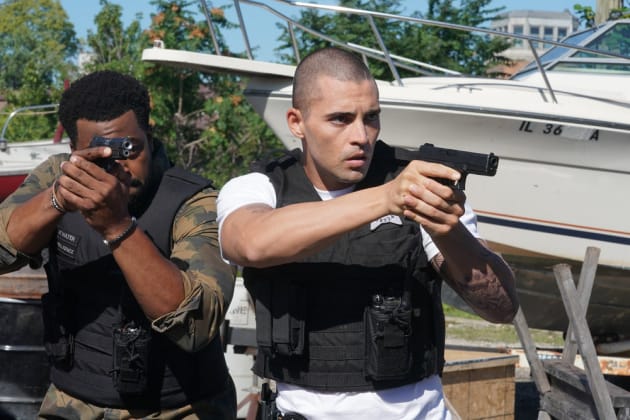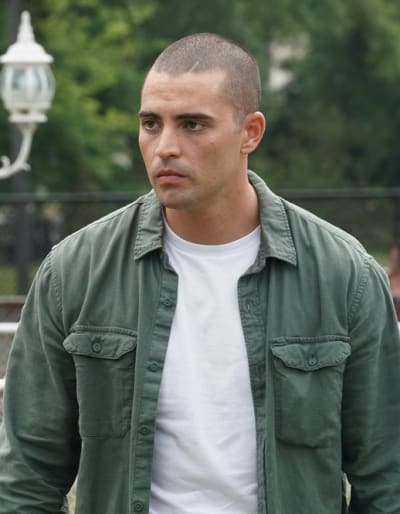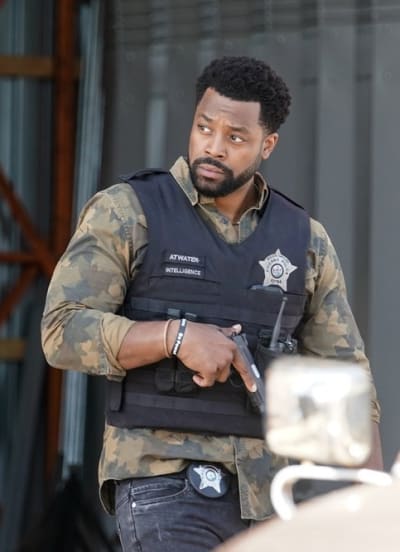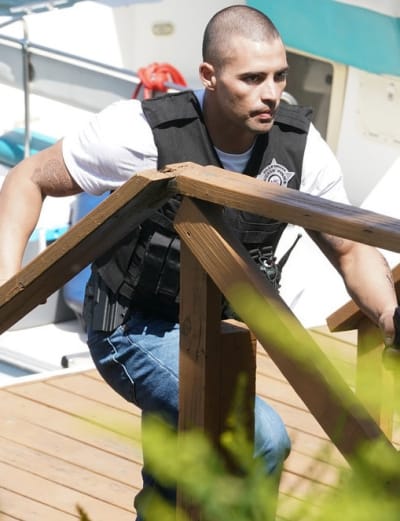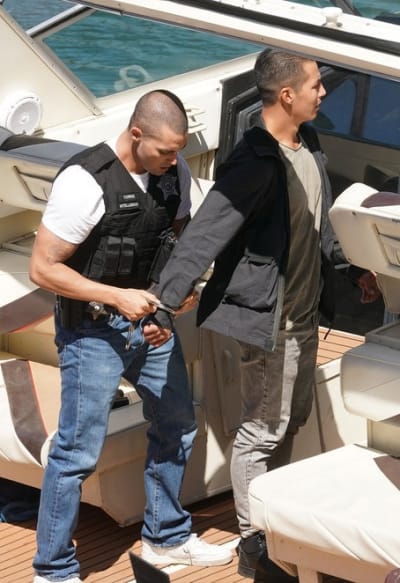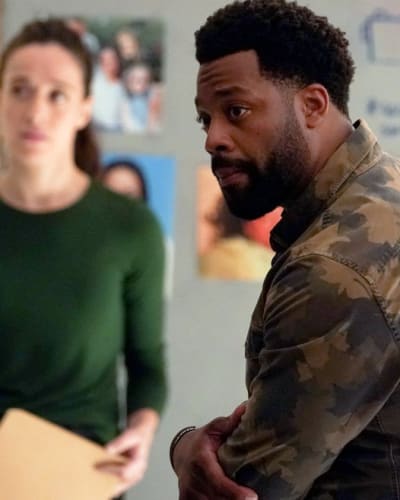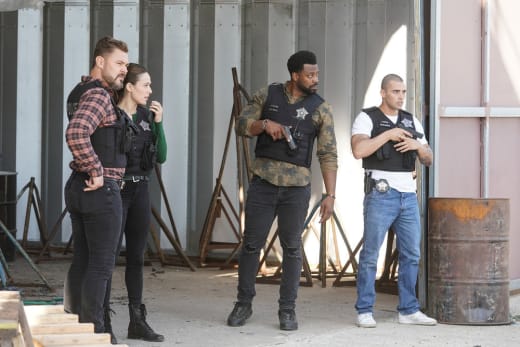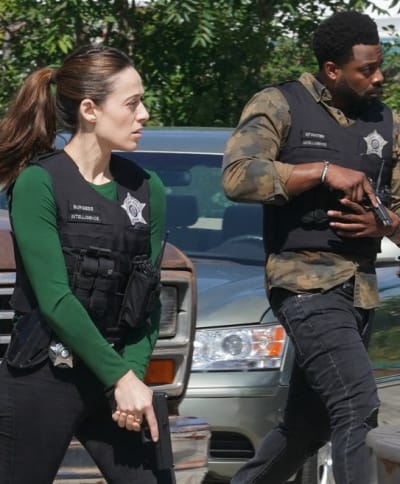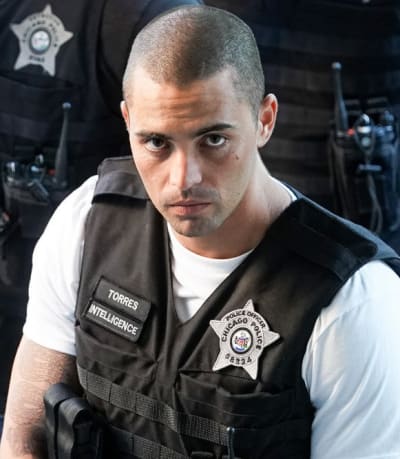We got our first Dante Torres-centric, and Chicago PD Season 10 Episode 4 did not disappoint.
Benjamin Levy Aguilar continues to shine in this role, proving his star quality and talent at every turn. And Dante Torres has officially carved out his place in the Intelligence unit and the series.
His addition is one of the best decisions in years.
Many of us had our speculations, and I’m happy to report that Oceanwater is everything we could have ever wanted and better than we imagined.
In Jay’s absence, Torres needed a mentor, and there is no better, more logical, and more compelling choice than Atwater.
They have similarities from what it’s like as Brown/Black men, particularly serving as police, knowing the fraught history and experiences of BIPOC and law enforcement. They also know the specific struggle of trying to walk that line as a man of color and a police officer when more often than not, they seem like two things that can’t co-exist.
Atwater and Torres’ understanding of the importance of their position and the bridge that they operate as, or the duality of serving as a shield or a sword for their respective communities to protect them — be it protecting their communities from the police and system, or protecting the community from one another — it weighs heavily on them.
It dictates how they operate and move and everything they do as they recognize and share a mutual belief that they can make a genuine difference and instill change from within the system.
No one else can guide Torres through those things, which made every single second of Atwater guiding him through this personal case prime viewing. It’s something that both did a stellar job of further introducing us to Torres as a character and expanding Atwater’s role in the series.
Atwater easily takes to the mentor role, and you can tell it’s the beginning of a beautiful relationship. Atwater has walked this path before in the series, and as supportive as the unit is for him, there’s no denying that Atwater walked this path alone.
It makes the instant bond he’s formed with Torres so special and more meaningful because he gets to provide Torres with something he didn’t necessarily have. And that’s another credit to why the series thrives when the diversity does.
Working in your hood is going to shake you up, but I got you on that, whether you like it or not, I got you.
Atwater
But they’re also different people with a unique set of experiences, and so they bring something different to the table, which keeps things refreshing.
The series being ten years in helps that narrative tremendously because we’ve seen Atwater’s journey, how he has grown and evolved, and how he earned every bit of the experience and the position to guide a newbie like Torres in every way.
Atwater’s growth juxtaposed with Torres getting his feet wet made their stories so intertwined and is one of many reasons this installment worked so well.
The hour asked ¿Dónde Vives? And it may as well have asked us who Dante Torres was. But who he is — it’s so inextricably linked with where he’s from and how that will impact him as a cop moving forward.
People don’t trust the police. Police don’t trust the people, so I take care of things when I can.
Torres
He doesn’t want to choose between his community and his job, and he’s adamant about his ability to maintain both, but he will be trying at every turn.
Everyone was asking who Torres was, and the hour showed us. One scene that stood out instantly was the effortless depiction of him and his mother casually speaking Spanish and having dinner together.
Representation is normalization, and everything about that moment felt so genuinely authentic that it was refreshing.
It doesn’t feel like we’ve gotten this rawness, at least consistently, with a character’s personal life, in some time. The personal element felt very true to what the series used to be in its heyday.
Personal cases for the characters are always great ways of exploring them deeper, and this was no exception. My heart broke for Torres when he found Provi’s body.
One can only imagine the guilt he felt over missing her calls, learning that she was reaching out to him for help, and he didn’t get to her in time to make a difference.
We know that’s his primary goal, so right out of the gate, it left him reeling and grappling with that particular failure as it pertains to his designated mission.
Torres is so committed to his goal that he almost gets himself killed. He doesn’t want to shoot Brown and Black people in his neighborhood. Instinctively, he wants to protect everyone the best way he can, but he needs a bit of a reality check about that.
It’s good that he can put in the work and sometimes succeed in talking people down or getting through to them, but he can’t put himself at such a risk that he pulls the trigger too late. The consequences of his hesitation or the weight on his conscious could be the difference between life and death.
Nothing can test a community and where one stands in it like murder. Provi deserved justice, and you wouldn’t think Torres doing whatever he could to find the person responsible for her death would cause so many issues.
However, the hood wanted to invoke its own form of justice, and it didn’t involve turning or confiding in Torres. They don’t trust the police, and despite Torres’ status there and his years of protecting the neighborhood, they don’t want to trust him either.
The case spilled into a gang angle with the 1-8, and the deeper into that the hour leaned, the harder it was on Torres.
His biggest strength and weakness are one in the same, and he can connect with people via his humble roots, street cred, and repping the same neighborhood.
The poor guy must’ve recited his address half a dozen times. It’s not something you’d be accustomed to a cop doing because of the dangers it poses to them.
But Torres assumes that risk for the sake of reminding everyone that he’s one of them, even if he’s wearing a badge. Sadly, his mother does as well.
And the reality of that hit him full-stop when Romero knew what buttons to push. Even the implication of a threat is nerve-wracking when Torres’ mother lives there.
Her missed calls because the smoke detector had Torres nearly botching their operation. He was so fearful that someone was coming after his mother because of him that he almost coat them a lead, and things got dangerous for Mia.
You can understand how she felt used by the end of the hour. Clearly, they had a close relationship with one another, and Torres probably didn’t lean into it enough upfront before he resorted to checking her phone for information and so forth.
The gang member beating Mia up was upsetting. Yes, much of it was because of Quico’s bullcrap, but it was frustrating that so much of this spiraled out of control because too many people were afraid to talk while simultaneously shutting Torres out.
Even the situation with Quico was maddening. He knew who Provi’s killer was, but he kept it under wraps out of fear. But if the gang was coming to kill him anyway, then he should’ve come out with it so Provi could have justice.
Mia: You promised. You promised to help him.
Torres: I know.
Mia: Twenty years? My brother gets 20 years for felony murder? Twenty years for not even pulling the trigger? That’s your help?
Quico’s own actions led to Provi’s unfortunate and tragic death and his 20-year sentence for felony murder. Despite everything, Torres protected him as best as he could, and Mia still got angry at him for it.
What more could he have done? Unfortunately, the community and Torres aren’t aligned regarding what protection and looking after them actually looks like.
But if anyone forgets who he is, where he’s from, and what he’s about, his beatdown of Romero puts some respect on his name.
Romero’s warning is something that Torres should probably heed, and I’m definitely concerned about him and his mother sticking around when everyone is pissed at him.
She was calling me for help.
Torres
It’s also concerning that Romero may retaliate for that beatdown. However, it’s also possible that the move earned Torres enough respect that the gangs won’t move into their territory or test Torres.
Everything about this installment was strong. We got more insight into Torres, and he continues to impress.
All the little touches, from his saint card, tattoo, or even the frustrating fact that he only wears white tees, felt like these bits and pieces that put him into perspective.
It could’ve been a risk to have the newest character carrying an installment directly after the departure of a veteran, but it paid off.
It’s going to be real strange around here without Jay.
Ruzek
We had enough team moments sprinkled throughout, especially the little moments that showed each of them giving Torres advice in their own way.
They didn’t totally ignore Jay’s departure, even though it felt odd that we didn’t get the goodbyes. The small acknowledgments from the others that things would be strange without Jay were something.
And Hailey looked a bit despondent and affected by Jay’s absence. But that’s about the gist of it. It was the extent of checking in with her.
Over to you, Chicago PD Fanatics. What did you think of the installment? Did you enjoy the Oceanwater dynamic? How much did you like a Torres-centric? Sound off below.
You can watch Chicago PD online here via TV Fanatic.
Jasmine Blu is a senior staff writer for TV Fanatic. Follow her on Twitter.
